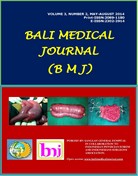CLINICAL-IMMUNOLOGICAL ASSESSMENT FAILURE ON INITIAL COMBINATION USE OF ZIDOVUDINE-LAMIVUDINENEVIRAPINE IN CHILDREN WITH HIV/AIDS AT SANGLAH HOSPITAL BALI
Abstract
Background: Assessing clinical progression and CD4+ level were important in determining the efficacy of antiretroviral (ARV) and switching to other regimens, especially when viral-load data were not available. This research aims to assess combination of zidovudine-lamivudine-nevirapine (Co-ZLN) failure using WHO 2010 criteria on clinical failure (CF) and immunological failure (IF), single or together, to determine correlation between CF and IF; and to evaluate two failure categories (CF alone and combination of CF-IF) in making decision to switch to second-line of ARV. Methods: Children at Sanglah General Hospital, who gain initial treatment of Co-ZLN in period of March 2006–March 2013 were selected. Cross sectional study was applied. The ARV response was assessed twice. First period (P1) and second period (P2) of evaluation were conducted after patients received the Co-ZLN at least 6 and 12 months. Results: Forty five patients were included in this study. After at least 6 and 12 months of therapy, more patients showed IF (10 and 9 children in P1 and P2) than those in CF (4 and 2 patients in P1 and P2). Only one child met to CF-IF category in P2. The low clinical condition (HIV stage 4) did not always associate with deteriorating immunologic marker in the treatment-failure (TF). The patients who fit on CF and CF-IF based decision to switch regimen criteria were different. In resource-limited hospital, CF-IF based decision could give a better picture of patients’ condition and be used as an indicator to assess TF compared to single CF criteria.


